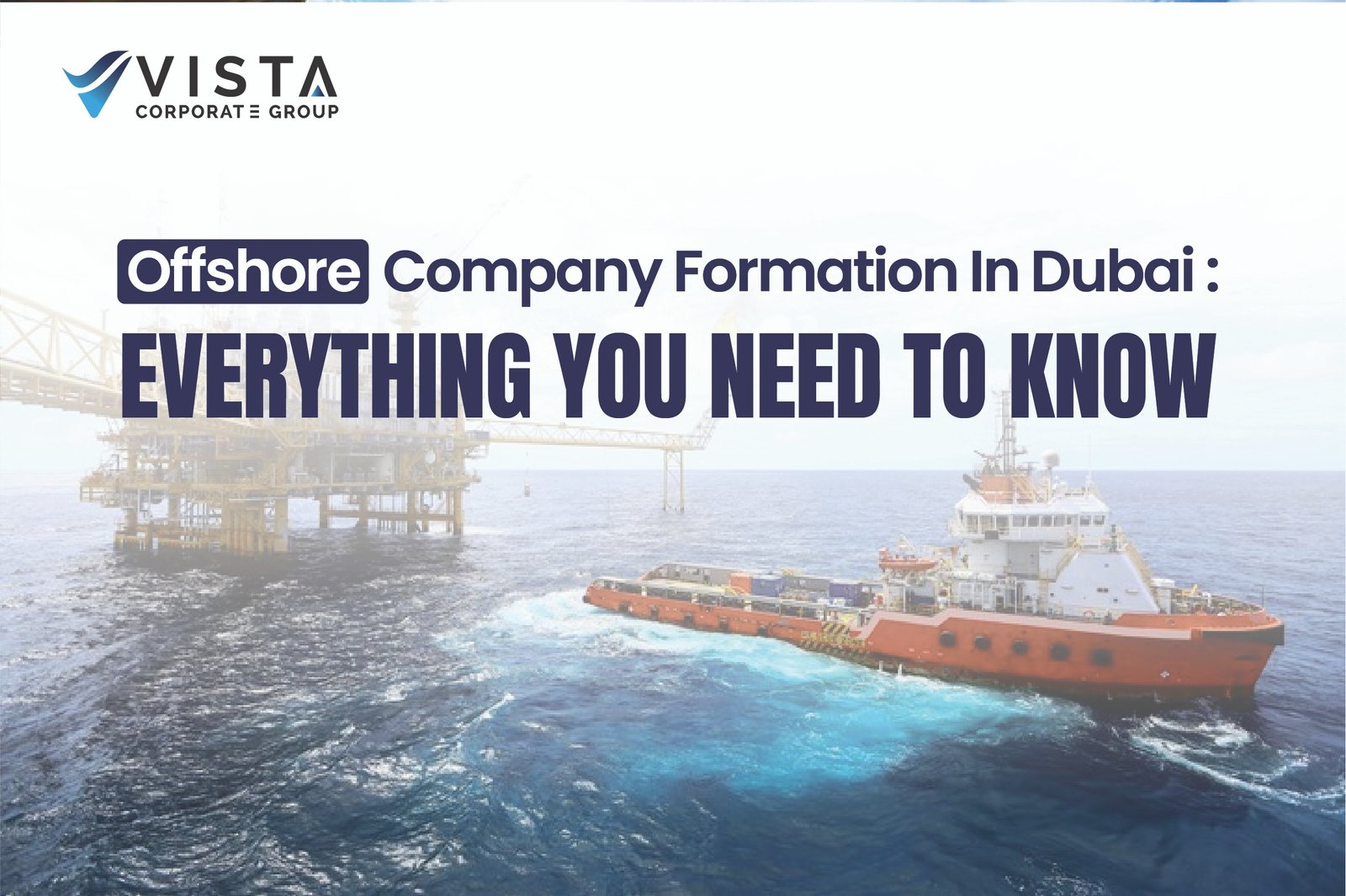
What Is an Offshore Company in Dubai?
In Dubai and the wider UAE, an offshore company refers to a legal business entity established in a jurisdiction outside the investor’s country of residence, primarily for conducting business activities outside the UAE. It is typically used for international trade, wealth management, asset protection, and tax optimization.
Unlike mainland or free zone companies, offshore companies in Dubai cannot conduct business within the UAE. Instead, they are designed for entrepreneurs and investors looking to tap into international markets from a secure and tax-friendly base. They offer a high degree of privacy, no local taxation, and ease of incorporation, making them highly attractive for global investors.
In simple terms, a Dubai offshore company allows foreign investors to own 100% of the business, with no requirement for a physical office or residency visas. These entities are governed by specific regulations depending on the chosen jurisdiction (such as JAFZA, RAKICC, or Ajman) and are primarily used for holding assets, opening bank accounts, and facilitating international transactions.
Dubai’s offshore frameworks are robust, secure, and globally compliant, ensuring that companies are recognized internationally while benefiting from UAE’s zero-tax regime for offshore operations. For this reason, many high-net-worth individuals, digital entrepreneurs, and multinational firms prefer this model for offshore company formation in Dubai.

Benefits of Offshore Company Formation in UAE
Setting up an offshore company in the UAE—especially in Dubai—comes with a wide range of advantages that appeal to international investors, digital entrepreneurs, and asset holders. From tax benefits to confidentiality, here are the key reasons why offshore company formation in Dubai is a smart move in 2025:
✅ 1. 100% Foreign Ownership
Unlike some mainland jurisdictions where local sponsorship may still apply in niche sectors, offshore company formation in Dubai guarantees 100% ownership to foreign nationals. This means complete control of your business, profits, and operations without the need for a local partner.
✅ 2. Tax Exemptions
Offshore companies are completely exempt from corporate tax, income tax, and VAT on their earnings—making them an excellent vehicle for wealth accumulation and global operations. This is one of the biggest advantages, especially for high-revenue businesses looking to optimize taxes legally.
✅ 3. Asset Protection and Confidentiality
Offshore structures are often used for asset protection, allowing individuals to hold real estate, intellectual property, or shares under the company’s name. Your identity remains confidential, as shareholder and director information is not publicly disclosed.
✅ 4. No Office Space Requirement
There’s no requirement to rent or lease office space when setting up a UAE offshore company. You can operate the business remotely, with a registered agent managing compliance and document submissions on your behalf.
✅ 5. Low Operational Costs
Running an offshore company comes with minimal overhead. You don’t need to hire staff, rent premises, or maintain a visa quota. With only an annual renewal fee, your operating expenses stay predictable and low.
✅ 6. Easy International Banking
Offshore entities in the UAE can open corporate bank accounts in reputable UAE and international banks. This is essential for international trading, investments, or holding funds in a stable banking jurisdiction.
✅ 7. Access to Global Markets
With no restrictions on foreign exchange, UAE offshore companies offer freedom to trade across borders, making them ideal for businesses operating in multiple countries. You can invoice, receive payments, and operate across continents with ease.
These benefits position Dubai as a leading offshore business destination, especially for investors seeking tax-efficient structures, international credibility, and legal protections.
Popular Offshore Jurisdictions In The UAE
When it comes to offshore company formation in the UAE, investors can choose from three main jurisdictions: JAFZA (Dubai), RAKICC (Ras Al Khaimah), and Ajman Free Zone. Each offers unique benefits depending on the nature of the business, costs involved, and intended use of the company—such as holding assets, trading internationally, or estate planning.
Let’s break down each offshore jurisdiction:
🔹 JAFZA Offshore Company (Dubai)
Jebel Ali Free Zone Authority (JAFZA) was the first offshore jurisdiction in the UAE, established in 2003. It is the only offshore zone that allows companies to own property in Dubai (with approval from relevant authorities).
Key features:
- Located within a world-class logistics hub
- Allows real estate ownership in designated Dubai zones
- Recognized by major banks for offshore banking
- High setup costs but premium reputation
🔹 RAK Offshore Company Formation (RAKICC)
RAK International Corporate Centre (RAKICC) is a highly popular offshore jurisdiction known for its fast setup, cost-effectiveness, and strong legal framework. It does not allow local business within the UAE but is ideal for international trade and asset holding.
Key features:
- Setup time: 3–5 business days
- Economical incorporation and renewal fees
- No office or employee requirement
- Can hold shares in mainland or free zone companies
🔹 Ajman Offshore Company Setup
Ajman Free Zone launched its offshore entity model to offer a flexible and affordable solution for foreign investors. It’s suitable for those seeking complete privacy and simplicity in incorporation.
Key features:
- Setup within 5–7 business days
- Low-cost entry point for offshore formation
- Ideal for holding companies and consulting services
- Supports international bank account opening
Offshore Company Legal Framework and Regulations in UAE
When establishing an offshore company in Dubai or any other emirate, understanding the legal framework is crucial. Offshore jurisdictions in the UAE follow strict regulatory compliance standards, ensuring transparency while offering flexibility for international investors. These frameworks are governed by respective authorities that oversee offshore operations.
Governing Laws and Regulatory Authorities
Each offshore zone is governed by its own set of regulations:
- JAFZA Offshore Companies are regulated by the Jebel Ali Free Zone Authority under JAFZA Offshore Companies Regulations 2018.
- RAKICC is governed by the RAK International Corporate Centre, following internationally recognized compliance frameworks.
- Ajman Offshore falls under the Ajman Free Zone Authority, operating under UAE Federal Law and local offshore company rules.
These bodies monitor incorporation, annual renewals, and ensure offshore entities remain compliant with international practices such as KYC (Know Your Customer) and AML (Anti-Money Laundering) standards.
Key Compliance Requirements
Though offshore companies enjoy operational flexibility, they must adhere to a few key compliance rules:
- Maintain audited financial records (though submission is usually not required).
- Submit an annual renewal application via registered agents.
- Avoid conducting commercial activities within the UAE.
- Provide valid documentation for directors, shareholders, and beneficial owners.
Failing to meet compliance can lead to fines, blacklisting, or license cancellation.
Annual Renewal and Documentation
Offshore companies must renew their license every year, and this process involves:
- Paying the renewal fee (varies by jurisdiction)
- Verifying all shareholder/director info is up to date
- Submitting compliance confirmations through the registered agent
The registered agent will liaise with the offshore authority on your behalf to complete this process efficiently.
The Role of British Chamber Dubai & International Standards
Entities like the British Chamber Dubai play a supportive role in fostering ethical international trade and investment practices. They encourage transparent offshore operations aligned with OECD standards, especially since UAE was removed from the EU blacklist due to compliance upgrades.
This means that your offshore company in the UAE is seen as credible and trustworthy in the global financial landscape—so long as you adhere to the legal standards.
Step-by-Step Guide to Offshore Business Setup in Dubai
Forming an offshore company in Dubai is a streamlined process, but it still requires attention to detail and the right documentation. Whether you’re setting up in JAFZA, RAKICC, or Ajman, the process typically follows a consistent framework managed by a registered agent. Here’s a step-by-step guide to help you understand what’s involved:
🔹 Step 1 – Choose the Right Jurisdiction
Start by selecting the most suitable offshore zone for your business goals. Consider factors such as:
- Real estate ownership (only JAFZA allows it)
- Cost of formation and renewals
- Speed of incorporation
- Reputation and global recognition
Discuss your requirements with a licensed offshore business setup consultant in Dubai for tailored advice.
🔹 Step 2 – Select a Unique Business Name
Your company name must comply with naming conventions. It should:
- Be unique and not identical to existing companies
- Include the suffix “Ltd” or “Limited”
- Avoid terms like “bank,” “insurance,” or “government” unless special approval is obtained
The name must be approved by the chosen jurisdiction’s registrar before proceeding.
🔹 Step 3 – Prepare the Required Documentation
You’ll need to submit the following documents:
- Passport copies of all shareholders/directors
- Proof of address (utility bill or bank statement)
- CV or business profile
- 3 proposed company names
- Description of business activities
- Signed application forms (provided by registered agent)
Additional documents may be required depending on the jurisdiction.
🔹 Step 4 – Submit Application via Registered Agent
All offshore companies must be incorporated through a licensed registered agent. The agent will:
- Verify your documents
- Liaise with the offshore authority
- Submit the incorporation application
- Ensure KYC/AML compliance
This step ensures your company is legally registered and compliant with UAE regulations.
🔹 Step 5 – Open an Offshore Corporate Bank Account
Once your company is approved, you can open a corporate bank account in the UAE. Most offshore companies bank with:
- Emirates NBD
- RAKBANK
- Mashreq Bank
- ADCB
- International banks like HSBC (subject to approval)
Banks will require your company documents, business plan, and KYC forms for account opening.
🔹 Step 6 – Receive Certificate of Incorporation
Once your company is registered, you will receive:
- Certificate of Incorporation
- Memorandum and Articles of Association (MOA)
- Share certificate(s)
- Company stamp (optional but recommended)
You are now officially ready to conduct international business as a legally registered UAE offshore company.
This step-by-step process typically takes 3 to 10 working days, depending on the chosen offshore zone and documentation accuracy.
Dubai Offshore Company Requirements
To establish a Dubai offshore company, investors must meet a few essential requirements that vary slightly across jurisdictions but follow a generally consistent structure. Whether you’re setting up in JAFZA, RAKICC, or Ajman, here’s what you’ll need to get started in 2025:
Shareholders and Directors Criteria
Most UAE offshore jurisdictions allow:
- 1 to 50 shareholders (individuals or corporate entities)
- At least 1 director is required (can be the same as the shareholder)
- No UAE residency is required for shareholders or directors
- Corporate shareholders are allowed in JAFZA and RAKICC (not Ajman)
There’s no need to appoint a UAE national or local sponsor.
Documentation Checklist
The following documents are typically required:
- Passport copy of each shareholder and director (must be valid for 6+ months)
- Proof of residential address (recent utility bill or bank statement)
- Three preferred company name options
- Description of intended business activity
- Personal CV or professional profile
- Reference letter from a bank or professional contact (in some cases)
- Notarized and attested documents (for corporate shareholders)
Note: All documents must be in English or legally translated.
Registered Office Address Requirements
You do not need a physical office to register an offshore company in Dubai. However:
- You must appoint a registered agent
- The agent provides a registered address within the offshore zone
- This address will appear on your incorporation documents
You cannot lease office space or operate within the UAE market under an offshore license.
Nominee Services for Privacy (Optional)
For those who value confidentiality, many agents offer nominee director or shareholder services. These help:
- Keep your name off public documents
- Provide an added layer of privacy
- Comply with local laws while protecting your identity
This is perfectly legal and widely used by global investors.
Offshore Company Banking in UAE
Opening a corporate bank account is a crucial step after your offshore company formation in Dubai is complete. While the process may involve more due diligence than mainland or free zone companies, UAE’s strong banking infrastructure makes it a favorable jurisdiction for international banking.
Choosing the Right Bank for Offshore Companies
Not all banks in the UAE accept offshore clients, so it’s important to work with those that do. Some of the most offshore-friendly banks in the UAE include:
- RAKBANK (RAK)
- Mashreq Bank
- ADCB
- Emirates NBD
- FAB
- International options: HSBC, Standard Chartered (subject to more extensive documentation)
These banks typically require the company to be registered in a recognized jurisdiction like RAKICC or JAFZA.
Documents Required for Bank Account Opening
To open a bank account, you will typically need:
- Certificate of Incorporation
- Memorandum and Articles of Association
- Passport copies of shareholders and directors
- Proof of address for all parties
- Board resolution approving account opening
- Business plan and expected transaction volume
- CV or business profile of the owner
The documents must be notarized and sometimes attested, especially for foreign corporate shareholders.
Common Banking Challenges and How to Overcome Them
Due to global AML (Anti-Money Laundering) rules, banks are cautious about offshore structures. Common challenges include:
| Challenge | Solution |
| Long verification processes | Work with a consultant or PRO familiar with bank protocols |
| Lack of business activity proof | Prepare a detailed business plan with projections |
| Foreign shareholders without UAE links | Include professional references and additional documentation |
| Rejection due to high-risk sector | Choose low-risk, transparent activities and avoid flagged industries |
Benefits of Offshore Banking in the UAE
- Access to multi-currency accounts
- Online banking facilities
- Reputable banking jurisdiction
- International transfer capabilities
- Financial security and stability
- No currency control or exchange restrictions
A good registered agent or consultant can help you navigate this step efficiently, ensuring you meet compliance and successfully open an offshore bank account in the UAE—a major milestone in your international business journey.
Offshore Company vs Free Zone Company vs Mainland Company
When planning a business setup in Dubai, understanding the difference between offshore, free zone, and mainland companies is key. Each type has its own advantages and limitations, depending on your business goals, customer base, and operational needs.
Here’s a detailed comparison to help you choose the right structure:
Offshore Company
- Ideal for asset protection, holding investments, or managing international trade.
- Cannot issue visas or conduct operations within the UAE.
- Offers maximum privacy, minimal cost, and zero tax obligations.
Free Zone Company
- Great for startups, digital businesses, and SMEs focused on specific sectors.
- Can operate within the free zone and export internationally.
- Provides visas, flexi-desks, and 100% foreign ownership.
- Some zones now fall under UAE’s 9% corporate tax, based on business activity and income.
Mainland Company
- Perfect for businesses targeting the UAE domestic market.
- Can have retail stores, restaurants, clinics, etc. anywhere in the UAE.
- Post-2021, allows 100% foreign ownership for most activities.
- Subject to mandatory VAT and corporate tax compliance.
Which Structure Should You Choose?
- Go Offshore if you want to hold international assets, set up a trading arm, or protect your wealth.
- Choose Free Zone for an affordable launch with visa support, especially in sectors like tech, services, and media.
- Opt for Mainland if you need unrestricted access to the local UAE market and want to scale big.
Offshore Company Use Cases and Industries
A Dubai offshore company isn’t just a legal entity—it’s a strategic tool used by global entrepreneurs, investors, and corporations to streamline operations, protect assets, and scale internationally. Offshore entities offer flexibility, tax benefits, and privacy across several business models.
Let’s look at the top use cases and industries where UAE offshore company formation delivers the most value:
1. Holding Company for Global Assets
An offshore entity in Dubai can be used to own shares in other companies or hold real estate and investments globally. It helps in:
- Consolidating global assets under one corporate umbrella
- Succession planning and estate structuring
- Isolating liability from operating businesses
Example: An investor may hold real estate in Europe, shares in an Indian company, and a Dubai mainland business—all under one offshore holding company.
2. Intellectual Property (IP) Ownership
Dubai offshore companies are excellent vehicles to own and license intellectual property such as:
- Trademarks
- Patents
- Software licenses
- Copyrights
This structure enables royalty collection from global users and provides legal safeguards for IP assets.
3. International Trading and E-Commerce
Entrepreneurs who manage import-export businesses or global e-commerce platforms often use offshore companies to:
- Reduce taxation on profits
- Simplify global supplier and client payments
- Avoid complex customs procedures
It’s particularly beneficial when selling digital goods, software, or SaaS products to international markets.
4. Investment and Fund Management
High-net-worth individuals and fund managers often form offshore entities to:
- Pool funds from international investors
- Manage portfolio investments
- Reduce exposure to domestic regulatory scrutiny
This structure supports diversified investments in stocks, crypto, startups, and more.
5. Digital Businesses & Remote Entrepreneurs
With the rise of remote-first work culture, many digital nomads and remote business owners form offshore companies in Dubai to:
- Bill international clients
- Open multi-currency accounts
- Manage online income from anywhere
This is popular among consultants, freelancers, digital marketers, and course creators who don’t require physical offices.
✅ Other Notable Use Cases
- Family wealth structuring
- Aircraft and yacht registration
- Crypto and blockchain projects (in select compliant jurisdictions)
- Affiliate marketing networks
- Joint ventures between international partners
These diverse use cases prove why offshore company formation in Dubai is not limited to just corporations—it’s a versatile tool for global business growth across multiple industries.
Cost of Offshore Company Formation in Dubai
Setting up a Dubai offshore company is not only tax-efficient but also cost-effective—especially when compared to mainland or free zone setups. However, costs can vary depending on the jurisdiction, registered agent fees, and optional services like nominee structures or legal documentation.
Here’s what you should know about the actual costs of UAE offshore company registration:
2. Hidden or Additional Costs
Besides the standard formation fees, be mindful of potential add-ons such as:
- Attestation of documents (if shareholders are overseas entities)
- Courier charges for hard copy documents
- Bank introduction fees for offshore banking
- Notarization and translation charges
- Nominee services
Always get a transparent quotation from your business setup consultant to avoid surprises.
3. Annual Renewal & Maintenance
Each offshore company must renew its registration annually. This involves:
- Renewal of trade license and certificate
- Registered agent’s service fee
- Submission of compliance declarations
✅ What’s Usually Included in Setup Packages
Most agents offer bundled packages that include:
- Company registration
- Government fees
- MOA drafting and processing
- Share certificates
- Company stamp (optional)
- Registered office address for 1 year
- Bank account opening assistance
Ask your agent for an all-inclusive offshore formation package to streamline the process.
While offshore company formation in Dubai is one of the most affordable routes to global entrepreneurship, proper cost planning ensures smooth compliance and operations year after year.
Hiring Offshore Business Setup Consultants in Dubai
Although forming an offshore company in the UAE is relatively straightforward, working with a licensed offshore business setup consultant in Dubai is highly recommended. These professionals ensure compliance, handle legalities, and streamline the entire process from start to finish—saving you both time and costly mistakes.
Here’s what you need to know before hiring one:
Why Use an Offshore Business Consultant?
Setting up an offshore company involves several moving parts—documentation, regulatory compliance, jurisdiction selection, and bank coordination. A consultant can:
- Act as your registered agent (required by law)
- Help you choose the best jurisdiction for your needs
- Assist in name approval and document preparation
- Liaise with government authorities on your behalf
- Ensure your business stays compliant with UAE laws
- Speed up the bank account opening process
- Advise on cost-efficient structures and tax implications
Their insider knowledge and established relationships with local authorities make the process smoother and more secure.
What to Look for in a Setup Consultant
Before hiring, check for the following:
| Criteria | Why It Matters |
| Licensed Registered Agent | Mandatory to file offshore applications |
| Years of Experience | Familiarity with changing regulations |
| Transparent Pricing | Avoid hidden charges or surprise fees |
| Range of Services | Should cover setup, renewal, banking, legal |
| Positive Reviews or Referrals | Build trust through verified testimonials |
| Support in Your Language | Helpful for international clients |
Also, ensure they explain the limitations of offshore companies honestly—such as lack of local trade rights or visa issuance.
Best Offshore Company Formation Consultants in Dubai (2025)
Here are a few reputable providers in the UAE that specialize in offshore setups:
- Vista Corporate Group – Known for affordable pricing and personalized service
- Commitbiz – Good for RAKICC and JAFZA setups
- Adam Global – Offers multi-jurisdiction advisory
- Virtuzone – Popular among startups and e-commerce clients
- Flyingcolour – Strong documentation and banking support
Always compare 2–3 providers before committing and ask for a detailed proposal listing all services and charges.
Hiring the right offshore business setup consultant in Dubai is an investment in long-term compliance, business credibility, and peace of mind.
Common Myths and Misconceptions About Offshore Companies
Thanks to movies, media, and a few bad actors, offshore companies often carry a negative reputation. But in reality, forming an offshore company in a regulated jurisdiction like Dubai is a perfectly legal and widely used strategy for international business, investment, and wealth protection.
Let’s separate fact from fiction:
Myth 1: Offshore Companies Are Illegal
Truth: Offshore companies are 100% legal when formed in jurisdictions like JAFZA, RAKICC, or Ajman, and used for lawful purposes. They’re governed by transparent, internationally compliant laws, including AML, KYC, and FATF frameworks.
In fact, many Fortune 500 companies use offshore structures for global operations, and Dubai is recognized as one of the most compliant offshore jurisdictions globally.
Myth 2: Offshore = Tax Evasion
Truth: Offshore doesn’t mean tax evasion—it means tax optimization. A Dubai offshore company allows you to legally reduce or avoid double taxation by taking advantage of UAE’s zero-tax regime for certain offshore structures.
Proper documentation and transparent use of funds ensure that your offshore company remains fully compliant with international tax laws.
Myth 3: Offshore Companies Can Operate in the UAE
Truth: Offshore companies are not allowed to do business inside the UAE or lease office space unless they own shares in a mainland company or hold specific government approvals (JAFZA being an exception for real estate ownership).
If your intention is to sell products or services within the UAE, consider a mainland or free zone company instead.
Myth 4: Offshore Companies Are Anonymous and Hidden
Truth: While offshore companies in the UAE offer a high level of privacy, they are not anonymous in the legal sense. Authorities still require:
- Full disclosure of shareholders and UBOs (Ultimate Beneficial Owners)
- Bank compliance with KYC/AML checks
- Submission of business activity declarations
This makes them suitable for legitimate business use, not for hiding illicit activities.
Myth 5: Offshore Companies Can’t Own UAE Assets
Truth: While most offshore companies can’t own local assets, JAFZA offshore companies can legally own real estate in designated areas of Dubai, subject to approval from the Dubai Land Department.
Additionally, offshore companies can own shares in mainland or free zone companies—providing indirect control over UAE-based assets.
FAQs About Offshore Company Setup in Dubai
How much does it cost to open a business in Dubai?
The cost depends on the type of license and jurisdiction:
- Offshore company
- Free zone company
- Mainland company
Offshore setups are generally the most cost-effective for international operations without UAE presence.
Can you own 100% of a business in Dubai?
Yes. As of recent reforms, foreigners can now own 100% of their company in all business types:
- Offshore companies: 100% ownership always allowed
- Free zone companies: 100% foreign ownership by default
- Mainland companies: 100% foreign ownership allowed for most activities since 2021
No need for a local sponsor or Emirati partner in most cases.
What is the difference between Freezone and Mainland?
| Feature | Free Zone | Mainland |
| Ownership | 100% Foreign | 100% Foreign (Post-2021) |
| Market Access | Inside Free Zone & International | Anywhere in the UAE + International |
| Visa Eligibility | ✅ Yes | ✅ Yes |
| Office Requirement | ✅ Yes (minimum flexi-desk) | ✅ Yes (physical office needed) |
| Cost | Medium | Higher due to additional approvals |
Choose Free Zone if you’re going digital or export-focused. Choose Mainland if you want full UAE access (retail, services, etc.).
Which business is most profitable in Dubai?
Some of the most profitable sectors in Dubai in 2025 include:
- Real Estate Brokerage and Investment
- Digital Marketing and E-commerce
- IT Consulting and Web Services
- Tourism and Travel Agencies
- Financial and Tax Consultancy
- Trading and Import-Export (ideal for offshore setups)
An offshore structure is best suited for trading, holding, consulting, or IP licensing businesses operating outside the UAE.
How long does it take to form an offshore company in Dubai?
Offshore companies are among the fastest to set up:
- RAKICC: 3–5 working days
- Ajman: 5–7 working days
- JAFZA: 7–10 working days
If documents are in order and a reliable consultant is assisting, the process is seamless.
Can offshore companies get UAE visas?
No. Offshore companies cannot issue or sponsor UAE residence visas. If visa eligibility is a priority, consider:
- Free zone company setup (visa packages available)
- Mainland company setup (can sponsor employees and family)
However, offshore structures can still open bank accounts and conduct global business without requiring UAE residency.
Final Thoughts: Is Offshore Company Formation in Dubai Right for You?
Choosing the right business structure is crucial—especially in a jurisdiction as dynamic as the UAE. While mainland and free zone setups offer market access and visas, an offshore company in Dubai is purpose-built for global entrepreneurs looking for privacy, tax efficiency, and simplicity.
Who Should Consider a Dubai Offshore Company?
This setup is ideal for:
- International traders who don’t need to sell within the UAE
- Investors holding real estate, shares, or IP across borders
- Digital nomads and freelancers billing international clients
- High-net-worth individuals planning asset protection or inheritance
- Entrepreneurs launching e-commerce or online services from abroad
If your business doesn’t require a UAE physical presence, hiring, or residency visas, offshore formation is a powerful and cost-effective solution.
Things to Consider Before You Register
Before you begin the process:
- Understand that offshore companies cannot trade inside the UAE
- You’ll need to work with a licensed registered agent
- Visa sponsorship is not allowed for offshore structures
- Annual renewal and compliance filings are mandatory
- Bank account opening can take time and documentation
These limitations are minimal for those focusing on international operations, holding structures, or remote business models.
How to Get Started With Professional Help
The best way to ensure a smooth offshore setup is to:
- Select your jurisdiction: JAFZA, RAKICC, or Ajman
- Hire a reputed offshore business consultant in Dubai
- Prepare your documents and select your company name
- Submit the application via your registered agent
- Open your offshore bank account and start global operations
Companies like Vista Corporate Group, among others, offer end-to-end offshore formation services, including jurisdiction selection, document handling, and banking assistance.
How to Set Up an Offshore Company in Dubai (2025):
- Choose the Right Jurisdiction
Select between JAFZA, RAKICC, or Ajman based on your goals (e.g., asset holding, IP protection, global trade). - Pick a Company Name
Ensure the name is unique and complies with UAE naming rules. Submit 2–3 options for approval. - Prepare Documentation
Gather passport copies, proof of address, business plan, and any supporting corporate documents. - Appoint a Registered Agent
Offshore companies must be formed through a licensed agent who handles compliance and submissions. - Submit the Application
Your agent will file the documents with the offshore authority and ensure KYC/AML protocols are followed. - Open a Corporate Bank Account
Choose a bank that supports offshore companies and submit your incorporation papers and KYC documents. - Receive Incorporation Certificate
Upon approval, you’ll receive legal documents including your certificate of incorporation, MOA, and share certificates.
What is offshore company formation in Dubai?
Offshore company formation in Dubai refers to the process of registering a business entity in a UAE jurisdiction (such as JAFZA, RAKICC, or Ajman) that is legally permitted to operate outside the UAE. Offshore companies offer 100% foreign ownership, zero corporate tax, and full privacy, making them ideal for international trade, asset protection, and wealth management.
How to open an offshore company in Dubai?
Steps to Set Up an Offshore Company in Dubai:
- Choose a UAE offshore jurisdiction (JAFZA, RAKICC, or Ajman)
- Select a unique company name
- Prepare required documentation
- Appoint a registered agent
- Submit application and pay fees
- Open a UAE corporate bank account
- Receive your Certificate of Incorporation
Benefits of offshore company formation in UAE
Top Benefits of Offshore Company Formation in UAE:
- 100% foreign ownership with no local sponsor
- Zero corporate or income tax
- Confidential business structure
- Low-cost and quick registration
- No office space required
- Ideal for global trading and asset holding




